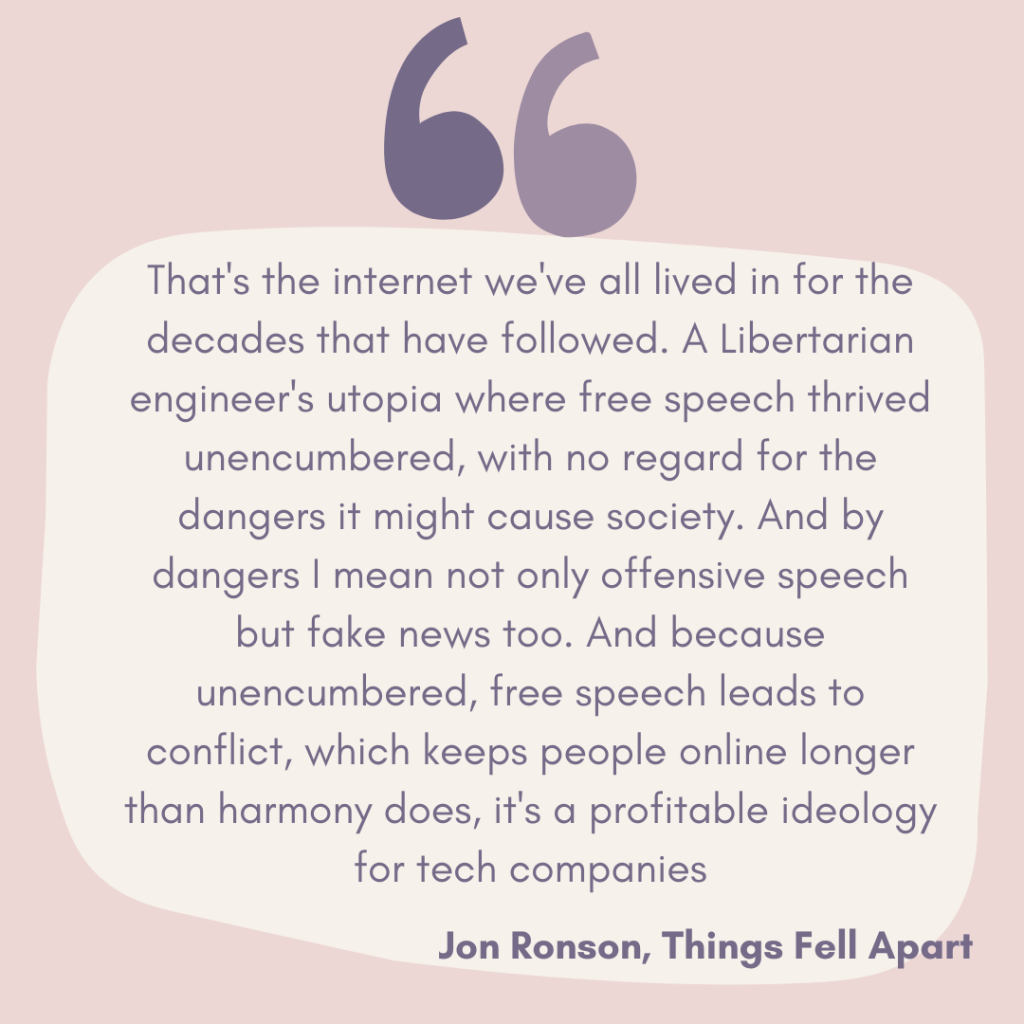Sunday Blog 46 – 24th July 2022

My latest podcast rabbit hole is Jon Ronson’s BBC Sounds Podcast Things Fell Apart. It looks at sliding door moments in the recent history of our culture wars. Each episode is compelling, but I got particularly stuck on Episode 5, A Scottish Jewish Joke, set in 1988 when the internet was first emerging.
This episode documents the very first identifiable social media shaming of Brad Templeton, whose Waterloo University hosted page published a joke everyday, including the very questionable Scottish Jewish joke of the episode’s title. It was randomly published using algorithms on November 9, 1988 via a program. This happened to be the anniversary of Kristallnacht, a coordinated wave of anti-Semitic violence by Germany’s Nazi party.
In the furore that followed, we humans had a chance, a sliding door moment to set some standards on what is published on the internet. At first it looked hopeful. The page was banned from Waterloo University, and Stanford University banned it too. Stanford’s decision was documented in an essay that noted the “love of freedom of expression mattered less that its collective search for a better way in which every person is acknowledged as an individual not a caricature.”
What an amazing online world that would be.
But it was not to be a lasting victory for kindness and inclusion. John McCarthy, tenured Stanford University professor, and one of the biggest names in computer science in the 1980s, was horrified by the thought of any constraints placed on the wild west world of the emerging internet. He rebutted this decision, and concluded “we’re really exploring the leading edge of computing here. Let’s keep exploring it. Don’t try and cut it off. We discover the boundaries of free speech by literally running into them, or crossing them.” 24.49
And that’s the internet we’ve all lived in for the decades that have followed. A Libertarian engineer’s utopia where free speech thrived unencumbered, with no regard for the dangers it might cause society. And by dangers I mean not only offensive speech but fake news too. And because unencumbered, free speech leads to conflict, which keeps people online longer than harmony does, it’s a profitable ideology for tech companies
Jon Ronson, 25 minute mark of Episode 5, Things Fell Apart.
What is so fascinating about this story is that the journalist who first shamed Brad Templeman in the 1980s is still a journalist to this day, still at the Waterloo Region Record newspaper. Recently she found herself on the wrong side of the culture wars when she wrote a piece downplaying the dangers of White Lives Matter leaflets that had been distributed in her town of Baden. Her investigations had revealed that such leaflets didn’t usually result in a march but were scattered around as a strategy to see if people would turn up.
In the roasting that followed her article, she experienced what Brad Templeman had experienced forty years previously. The fact that she was right and there was no riot did not eventuate in an apology or review of her public roasting as a racist. She reflected;
A true Free Speech advocate doesn’t differentiate between junky speech like insensitive jokes, and thoughtful arguments that are meant to help us understand the world that we live in.
Luisa D’Amato, journalist from Waterloo Region’s The Record,
Jon Ronson finishes the episode; “And from that day on, the internet would, in its peculiarly terrible way, influence the ferocity with which every culture war would subsequently be fought.”
A thought-provoking listen. Highly recommended.

I’m going to subscribe to this podcast, Ronson is always interesting!